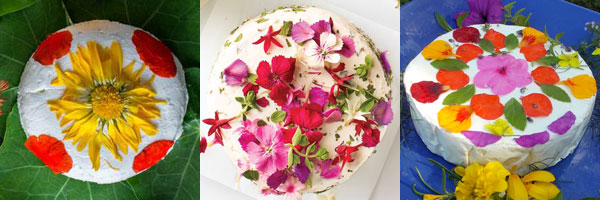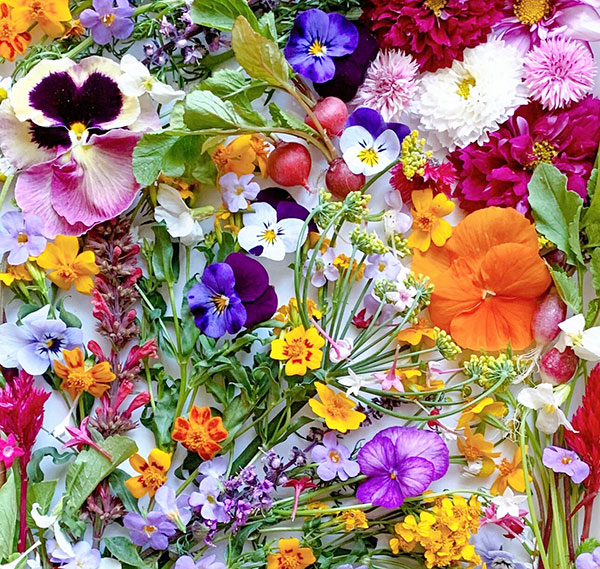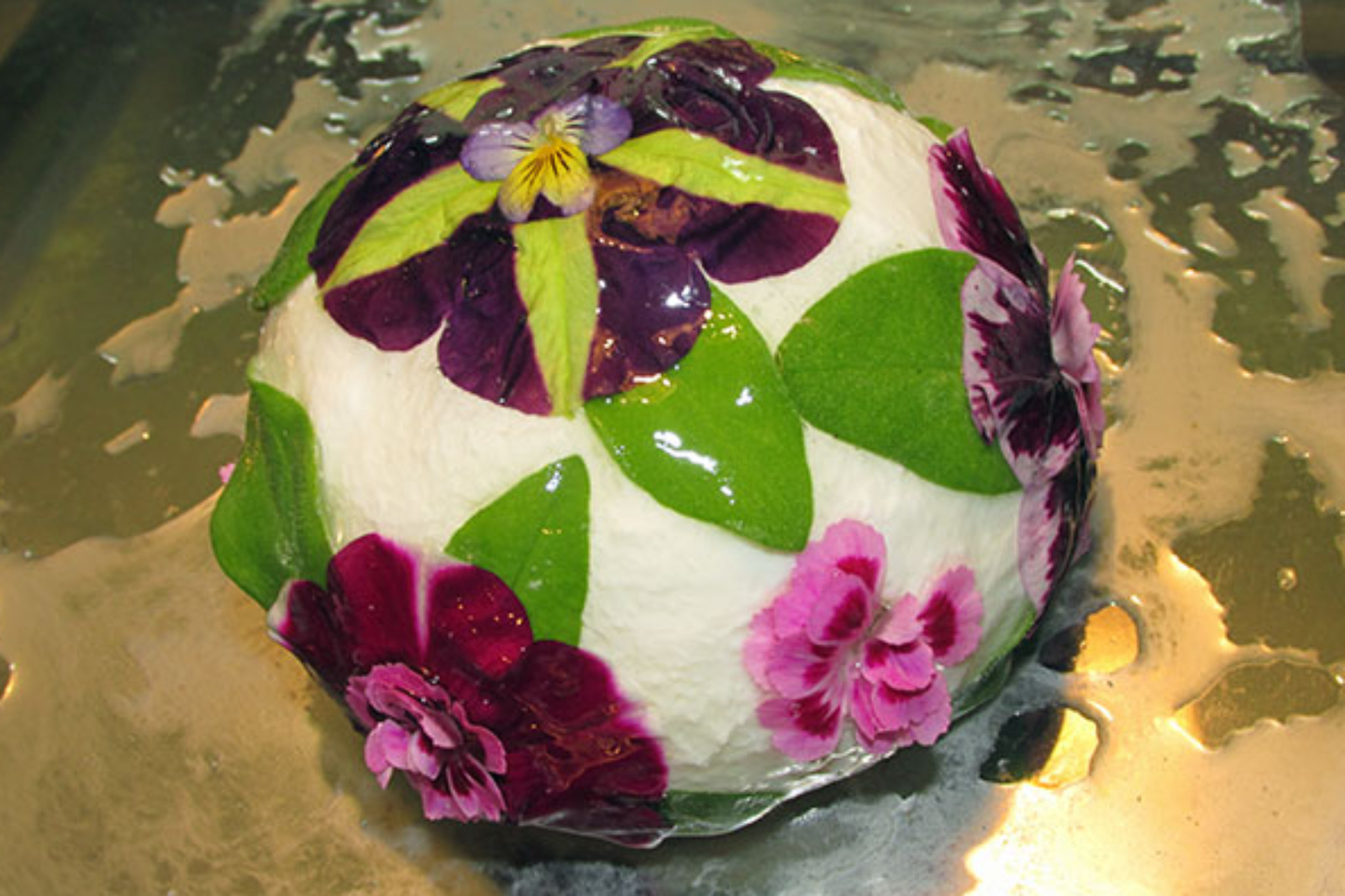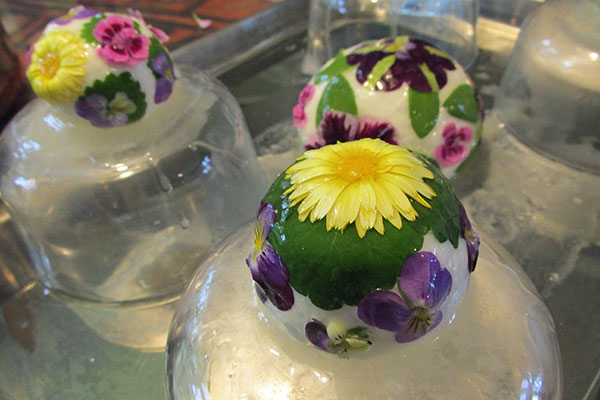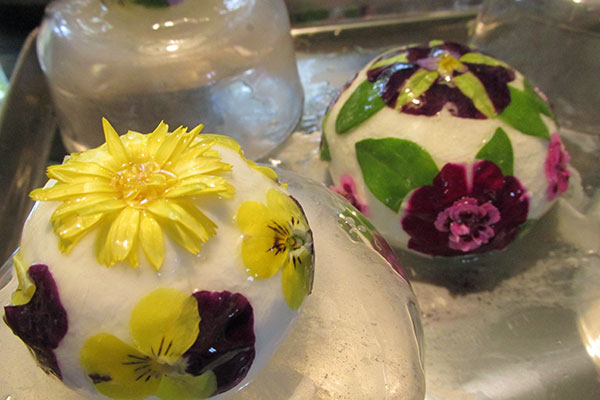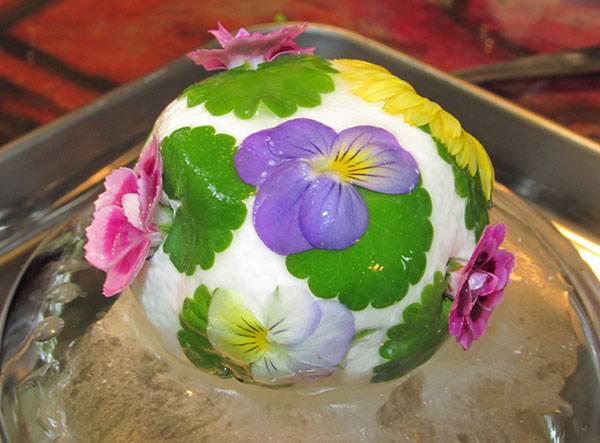Using Glaze to Adorn Your Cheese with Flowers
Posted by admin on
5 years ago, I posted an article (Using Wildflowers In/On Your Cheese) about picking and preparing wildflowers. Most of my information for that article came from Terry Dinnan, a home cheese maker in Charlotte, Vermont.
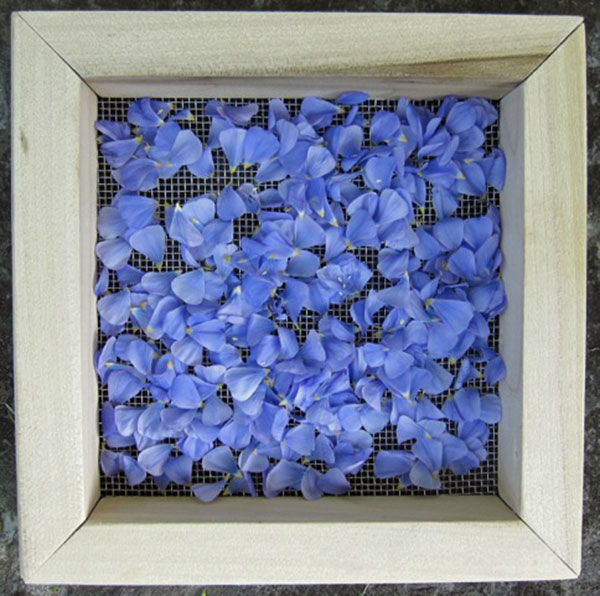
Terry’s flax petals drying in the sun. (If you want to add flowers to the interior of your cheeses, it’s best to dry them first.)
After posting that article, I began to notice that more and more people are using flowers to decorate their cheeses.
For example, Becca Heins, in Longmont, Colorado made these spectacular cheeses in 2017, and then waxed the flowers onto them:
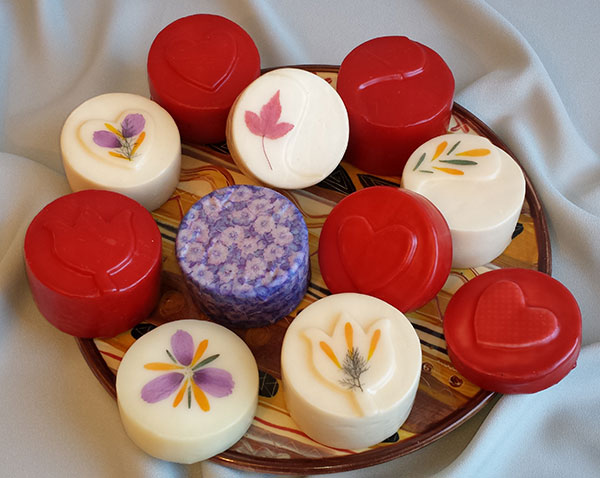
Becca used beautiful blue flowered cloth to wrap the cheese in the center. She waxed some of the other ones with flowers between the coats of wax.
Aspic Anyone?
This is serious fun!
Recently, I stumbled on a recipe (Completely Edible Flower Glazed Cheese) at the Once Upon a Plate blog, for making a glaze to brush over and under your flowers on your soft cheese. (You can use it on hard cheese also, but usually wax is the better choice for that.)
The glaze seemed like an attractive look, to say the least! I don’t have access at the moment to goat’s milk so I bought 2 logs of goat cheese and set out on an adventure.
Step 1
Gathering Your Decorations: You can order flowers and greenery through the mail or pick them yourself. It’s important to use organic plants that haven’t been sprayed with pesticides. (Keep in mind that some flowers are poisonous to eat.) There are several books available with more info about edible plants.*
Here’s a partial list of edible plants:
Wildflowers-
dead nettle
echinacea
goldenrod
henbit
horsetail
joe pye weed
milk thistle
mullein
oxeye daisy
prickly pear cactus
queen anne’s lace
redbud tree buds
red clover
rue
st. john’s wort
violet
wild rose
wood sorrel
yarrow
yellow dock
yellow rocket
Flowers-
calendula
cape jasmine
carnation
cherry blossoms
chrysanthemum
forget-me-not
fuchsia
freesia
geranium
gladiolas
hibiscus
hollyhock
honeysuckle
lilacs
magnolia
marigolds
nasturtium
pansies
pinks
primrose
rose petals
strawberry blossoms
sunflower
violas
violets
Greenery-
chive blossoms and stems
cilantro
dill
parsley
rosemary
sage
thyme
tarragon
watercress
Ordering: There are hundreds of edible flowers and herbs at Gourmet Sweet Botanicals. (If you know of other sources, please share them with us in the comments.)
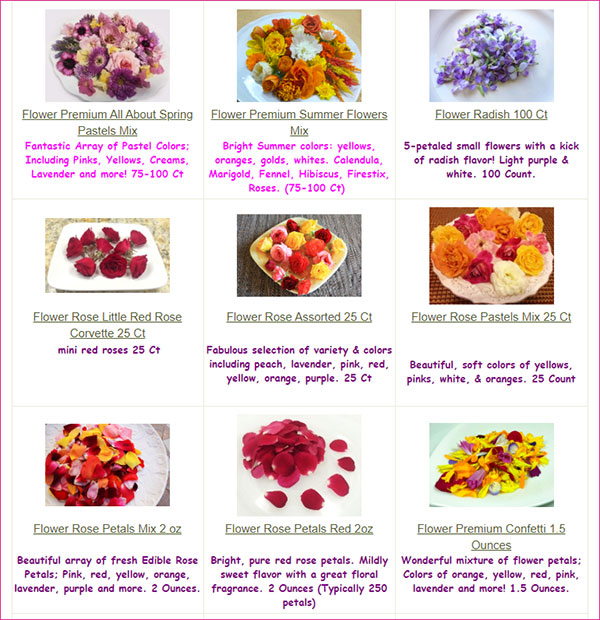
A screenshot of a few of the flowers listed at Gourmet Sweet Botanicals
Storing Your Flowers: After rinsing and blotting dry, store leaves and flowers in plastic bags in the refrigerator until ready to garnish your cheese.
Step 2: Glaze Recipe
Adapted from Once Upon a Plate where it was adapted from Sunset Magazine’s “Appetizer” cookbook, 1984
This is enough glaze to spend the entire day coating cheese. You can cut the ingredients in half.
2 cups dry white wine (you can use the non-alcoholic type)
1 envelope unflavored gelatin (Knox, for example)
Edible decorations
Directions:
In a 2 – 3 quart pan, combine wine and gelatin; allow to stand for 5 minutes. Place over medium heat and stir until the gelatin is completely dissolved and the mixture is clear.
Place the pan in a larger container filled with ice cubes and water, then stir the liquid occasionally until it begins to thicken and look syrupy. (This can take some time. Mine took 30 minutes and I added ice cubes at the halfway point.). If it becomes too firm, reheat to soften, then chill again until syrupy.
Place the cold cheese on a wire rack in a shallow rimmed pan. Decide upon your pattern/decorations. (My cheese was too soft to put on a wire rack, so I put it on a cookie sheet.)
Spoon a coat of glaze over the top and sides of the cheese. (I used a brush to slather it on.) When slightly tacky (1 to 3 minutes), decorate as desired with the flowers, leaves and/or herbs. Refrigerate the entire pan with rack and cheese, uncovered for about 15 minutes.
Spoon or brush more aspic over the top and sides of the cheese to cover it all. If desired, add one or 2 more coats, refrigerating after each layer is added.
When the cheese is completely covered with glaze, invert a bowl over it, without touching the surface, until ready to serve. This is to protect it. It can be prepared up to 36 hours ahead, but keep it refrigerated.
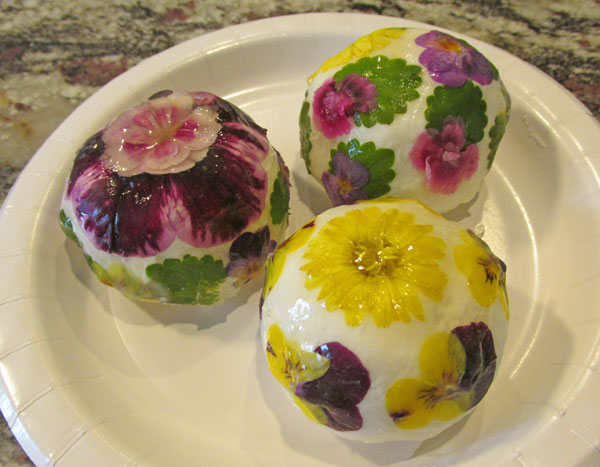
The next day, after I had tasted one of the little ones, I took the other 3 to a neighbor. They were not quite as shiny after spending the night in the refrigerator, but they still looked and tasted great.
Any unused aspic (including the drippings in the pan) can be refrigerated, covered, and kept for several days. To reuse; reheat to melt, then proceed as in the instructions, above.
Notes:
- This is a great project for kids (I’d say 12-16).
- It’s messy but the glaze doesn’t stick to anything – it just washes off.
- It can be tricky to move the cheese off whatever cookie sheet or plate you decorated it on. I used 2 spatulas (one on each side).
- I tasted it when I first started putting the glaze on it and it wasn’t nearly as good as the next day when the flavor of the wine had permeated the cheese.
- If you don’t want to eat the flowers and leaves, you can easily scoop out the goat cheese.
*Books about edible plants:
Edible Wild Plants: A North American Field Guide to Over 200 Natural Foods
by Thomas Elias and Peter Dykeman, 2009
The Complete Guide to Edible Wild Plants
by Department of the Army, 2009
Edible Wild Plants for Beginners: The Essential Edible Plants and Recipes to Get Started
by Althea Press, 2013
The Forager’s Harvest: A Guide to Identifying, Harvesting, and Preparing Edible Wild Plants
by Samuel Thayer, 2006
The Edible Flower Garden (Edible Garden Series)
by Rosalind Creasy, 1999
Edible Wild Plants: Eastern/Central North America (Peterson Field Guides)
by Lee Allen Peterson and Roger Tory Peterson, 1999


